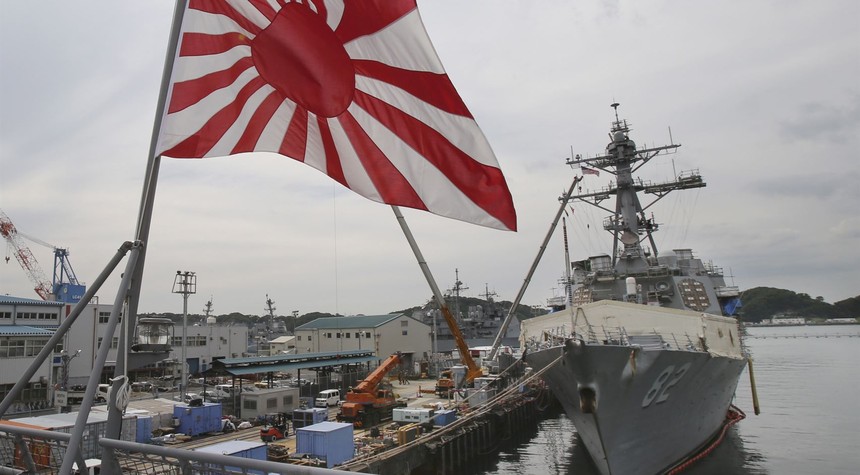I have traveled, stayed, and worked in Japan quite a bit, and think I understand that land and its people about as well as a gaijin can. It’s a beautiful country, with (mostly) friendly people, wonderful food, a great culture based on respect and consideration, and even some pretty good beers and whiskeys. I wouldn’t want to live there permanently; I’m too indelibly a red state – and RedState – American for that. But I’m very fond of the Land of the Rising Sun, and so keep abreast of events that affect Japan. To that end, it was interesting to see the release of the Ministry of Defense’s Defense of Japan 2023 report.
Japan’s Ministry of Defense uses annual white papers to survey the country’s strategic surroundings and explain how it means to manage them. Its latest such survey shows Tokyo upping its game vis-à-vis China in a major way.
The most startling statistic in Defense of Japan 2023 concerns funding for the Japan Self-Defense Forces (SDF). In the coming five years, Japan intends to spend over two and a half times on the SDF what it spent in the most recent five years. Japan envisions hiking the budget from 17.2 trillion yen to 43.5 trillion yen, or about $307 billion.
The Japanese military has long been a compact force of enviable repute. Now it is poised to become a force of serious heft as well. This marks a sharp break with history. For decades after World War II, to mollify opinion in Asia and around the world, Japan self-limited its defense budgets to 1 percent of GDP. It cast itself as an intrinsically inoffensive society, incapable of a new round of imperial conquest. That era of self-restraint is gone thanks to Chinese, North Korean, and Russian belligerence.
You can see the entire white paper here. Here’s the real kicker of the white paper itself:
Japan faces the most severe and complex security environment since the end of WWII. Japan needs to squarely face the grim reality and fundamentally reinforce its defense capabilities, with a focus on the capabilities of its opponents and new ways of warfare, fundamentally reinforce its defense capabilities, with a focus on the capabilities of its opponents and new ways of warfare, in order to protect the lives and peaceful livelihoods of the Japanese nationals.
Thinking strategically, Japan’s deterrence will be enhanced by fundamentally reinforcing its defense capabilities as well as reinforcing the defense architecture for national defense as a coherent whole.
Based on this recognition, the Government of Japan finalized the NDS to comprehensively present Japan’s defense objectives, approaches and means to accomplish those objectives, and the means to achieve them. The NDS replaces the NDPG, which was formulated six times since1976. The NDS represents a major turning point for postwar defense policy and provides the direction and content for strengthening defense capabilities over the mid-term to long term.The Government will make every effort to deepen the public’s understanding of the significance of this major turning point.this major turning point
Remove the political speak from that and what you get is “we (Japan) are really worried about recent developments in the Western Pacific; China, North Korea, and Russia are all becoming increasingly belligerent, so we’re going to up defense spending and enhance our already high-tech, high-precision force and enhance our ability to project power.” China and Russia in particular have been making some aggressive moves, not just in the Western Pacific but rather nearer our own shores as well.
Japan, unfortunately, also faces a demographic crisis that limits its population of young men of military age, who are the primary warfighters. Russia and China face similar problems, though, and Russia is currently expending a fair number of its military-age men in Eastern Europe.
What’s left unsaid here, but merits some speculation, is whether Japan retains much confidence in its primary Pacific ally, that being the United States. Examine it, if you will, from the Japanese viewpoint; the United States leadership is moribund, its military is increasingly compromised by policy and by foreign agents, its Navy can’t seem to do basic ship handling, and the nation is beset by overwhelming debt and internal strife. It would be wise for Japan to not rely overmuch on assistance from the United States; indeed, while alliances are great, every nation should stand on its own to the greatest extent possible. It looks like Japan is moving in just that direction.

I have many great memories of Japan, from hiking through the blazing fall colors of late November near Arishiyama to a memorable evening in Kyoto drinking beer with four friendly, jovial guys who I realized later were almost certainly Yakuza. While that country faces some serious issues there in the Western Pacific, it’s good to see they are doing what they can to ensure the survival of Japan, its people, and its culture.
Now, if we could just get our government to show the same concern for America, its people, and its culture.

